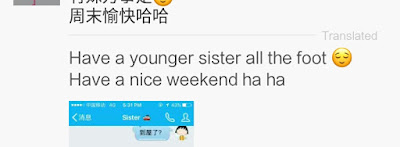Translation Fails: WeChat Edition

Language is one of the most interesting, beautifully complicated things that everyone in the world has the opportunity to experience. Culture, language, understanding of self, and time are inextricably connected, and in order to really learn another language one basically has to completely change the way he thinks about himself, others, and the world. But languages are hard to learn (unless you've got some kind of crazy language-learning gift, which I'm totally not jealous of except I am), and usually it's just easier to go to a dictionary or the internet for a quick, direct translation from some other random language to your own. They're handy, they're quick, and they're not usually very accurate, which can result in anything from frustrating communication breakdown to mass hilarity. Today's post is hopefully the latter. Most people already know how hilariously inaccurate Google Translate is sometimes (check out Malinda Kathleen Reese's YouTube

